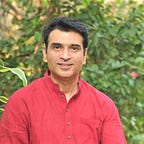How To Act Without Desire?
From doing to Witnessing.
All our actions stem from desire. Even the desire to be desireless is a desire. It is almost impossible to practice Krishna’s advice to Arjuna in the Bhagavad Gita, ‘nishkama karma’, desireless action.
“The cause for human suffering is desire.” says Buddha
Yet, desire and action is fused together.
Is it possible to purify action by removing desire? What does one do?
Shift our attention.
What do I mean by that?
Let’s start with a simple exercise. “Are you breathing right now?” I am assuming if you happen to be alive, the answer will be “Yes, I am breathing”. Good! Let me repeat the question “Are you breathing right now?” Your answer is likely to be “Yes, I am breathing. Didn’t I already tell you!” Great! Let me once again repeat the question “Are you breathing right now?” Now probably you will start wondering why am I repeating the same question again and again?
Let’s drop the question for the moment. Bring your attention to watching your breath. Watch the incoming breath…the outgoing breath…the movement of your body…as you breathe in…as you breathe out. Do it for some time. Now let me ask the same question “Are you breathing right now?” Some of you may now say “It is happening.”
What brought about the shift from “I am breathing.” to “It is happening.”
Witnessing.
When we shift our attention to witnessing, we realize all thoughts and actions are happening. When we witness, the attention moves from unconscious thinking to awareness of what is happening. The ‘I’ transforms from the ‘personal doer’ of the action to the ‘impersonal space’ in which action happens.
Rather than desire to be desireless, be the witness of what’s happening.
Yes, I can sense your next question.
“It is easy to say the breath is happening, or blood circulation and digestion is happening. These are bodily functions. What about the actions we ‘decide’ to do? Like making a cup of tea, going for a walk, writing an article, surely they are not happening. We are doing it.”
Please read the next sentence carefully, and reflect on it for a moment.
“We feel we are doing something only because our thoughts make us believe we are doing something.”
Do ‘you’ sleep? Do ‘you’ dream? Or does it happen?
There is no doer of sleep or dream, because the thinking mind is absent in that state. After we wake up the thinking process starts and we say “I slept” or “I dreamt”.
This gives us a vital clue.
The vehicle of doership is thought.
If there were no thoughts, actions would happen, without any individual taking credit for the actions.
I know what I am saying may seem radical to some and take time to assimilate. But since the inquiry is initiated let’s take it further.
“How can one live without thinking?” one may ask.
Firstly we must realize thinking is not something we do, it is mostly an unconscious activity. We do not use thoughts, thoughts use us. They make us believe we are a separate individual deciding, acting and reaping the consequences of our actions.
We can break free of this illusionary chain created by thoughts. The simplest way to do it is to shift our attention from unconscious thinking to witnessing.
Whatever you may do in your life, from the most significant — shaking hands with the President — to the most mundane — brushing your teeth — be the witness of actions. In witnessing, actions are happening, as they are meant to happen.
“What about making decisions?” How do we make the right decisions?” may be the next question.
The more we become self-aware, the lesser our actions are fueled by the feverishness of desire for future outcomes. This moment of existence feels complete. This moment naturally leads into the next moment. What needs to be done gets done. What is not necessary remains undone.
Our fulfilment no longer stems from the desire to achieve this or that. Our joy is not dependent on doing or the outcome of our actions. It stems from Being. From having a mind not cluttered with thoughts, clinging to mental projections, judgments and opinions. A mind free of thoughts. There is a feeling of deep contentment and harmony within.
For most of us, no matter what we achieve, or who we become, our memory will get wiped out and forgotten in two generations. Rather than devoting our lives to gain the respect and admiration of others, why not devote our lives to freedom.
Freedom from the confines of our mind. And the simplest way to free ourselves from the bondage of thoughts is to witness them. After all, the seed of all actions stems from thoughts.
When we abide as the witness, our natural mode of existence will gradually transform from doing to Being. Within that Being thoughts and actions occur. Within that Being everything unfolds.
Within that Being life happens.
***
